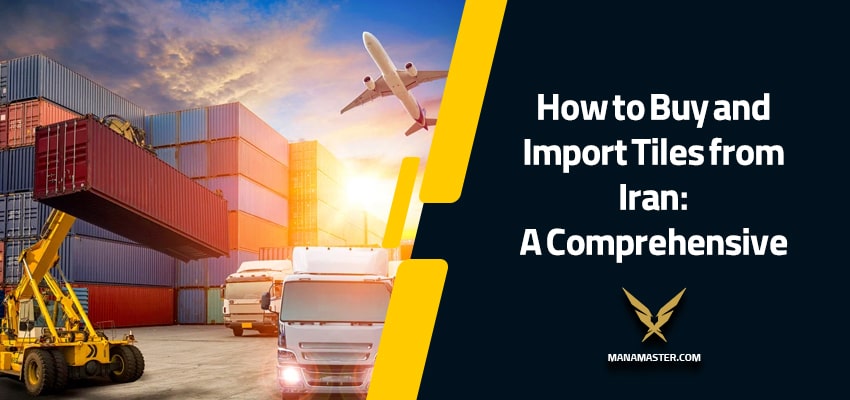Iran is renowned for its rich history, cultural heritage, and exquisite craftsmanship, particularly in the realm of tile production. With its diverse range of colors, patterns, and designs, Iranian tiles have gained popularity worldwide. If you’re considering buying and importing tiles from Iran, this comprehensive guide from manamaster will walk you through the essential steps and considerations to ensure a smooth and successful process.
Looking for a reliable company to import tiles from Iran to your country?
leave your number and we will contact you shortly.
Import tile from Iran : What You Need to Know
1. Research and Identify Iranian Tile Suppliers:
Start by conducting thorough research to identify reliable irani tiles suppliers. Look for companies with a strong reputation, positive customer reviews, and a wide selection of high-quality tiles. You can explore online directories, industry trade shows, and engage in discussions on forums related to the tile industry to gather valuable insights and recommendations.
2. Evaluate Product Quality and Varieties:
Once you’ve shortlisted potential suppliers, evaluate their product quality and range of tile varieties. Consider factors such as material, durability, finishes, design options, and whether they align with your target market’s preferences. Request samples or visit the supplier’s showroom if possible to assess the quality firsthand.
- read more: choosing bathroom tiles guide
3. Understand Import Regulations and Requirements:
Familiarize yourself with the import regulations and requirements of both Iran and your destination country. Consult with the respective customs authorities or engage the services of a customs broker to ensure compliance with all necessary documentation, permits, and restrictions. This step is crucial to avoid any potential legal or logistical complications during the import process.
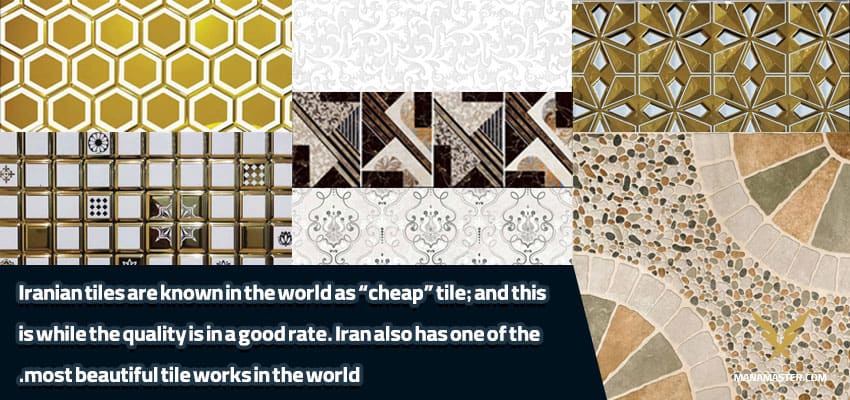
4. Establish Clear Communication:
Effective communication is key to a successful import process. Ensure you establish clear and consistent lines of communication with the Iranian tile supplier, discussing important details such as pricing, product specifications, packaging, shipping methods, and delivery schedules. Clarify any questions or concerns you may have to avoid misunderstandings or discrepancies.
5. Negotiate Pricing and Payment Terms:
Negotiate pricing and payment terms that are mutually beneficial for both parties. Take into account factors such as order quantity, transportation costs, and any additional services required, such as packaging or labeling. Consider using secure payment methods to protect both your interests and those of the supplier.
6. Arrange Shipping and Logistics:
Work with the Iranian supplier to arrange the shipping and logistics of the tiles. Discuss transportation options, such as air or sea freight, and consider factors like transit time, shipping insurance, and the supplier’s experience in exporting goods. Ensure proper packaging and labeling to safeguard the tiles during transit.
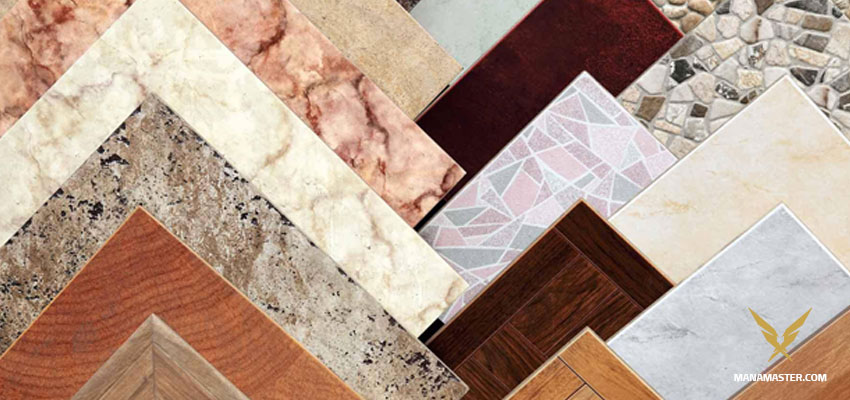
7. Customs Clearance and Documentation:
Prepare and submit all necessary documentation required for customs clearance in your destination country. This may include commercial invoices, packing lists, bill of lading, import permits, and certificates of origin. Engage the services of a customs broker if needed to navigate the complexities of customs procedures smoothly.
8. Inspect and Receive the Shipment:
Upon the arrival of the tiles in your destination country, conduct a thorough inspection to ensure the received goods match the agreed-upon specifications and are free from any damages incurred during transit. Promptly address any discrepancies or issues with the supplier and the shipping company.
9. Market and Distribute Your Tiles
Develop a comprehensive marketing and distribution strategy to promote and sell the imported Iranian tiles. Utilize various channels such as online platforms, trade shows, retail stores, or collaborations with interior designers and architects. Emphasize the unique qualities and cultural significance of Iranian tiles to attract potential customers.
video on how to import tiles from Iran
Looking for a reliable company to import tiles from Iran to your country?
leave your number and we will contact you shortly.
Countries Iran Exports Tiles to:
Iran is a major exporter of tiles, supplying its products to 52 counties around the world. Some of the primary destinations for Iranian tile exports include:
United Arab Emirates (UAE): The UAE is a significant market for Iranian tiles due to its booming construction and infrastructure sectors. Iranian tiles are highly sought after in the UAE for their quality, unique designs, and competitive pricing.
2. Iraq: Iraq is another prominent market for Iranian tiles, driven by the country’s ongoing reconstruction efforts and increasing demand for construction materials. Exporting Iranian tiles to Iraq are favored for their durability, aesthetic appeal, and affordability.
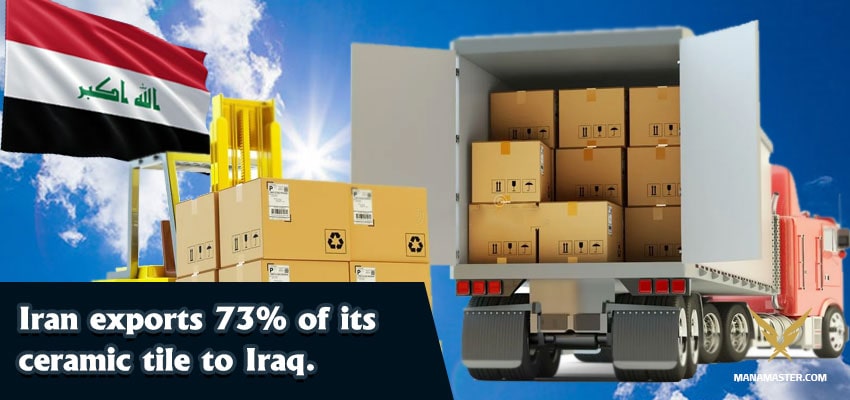
3. Afghanistan: Iranian tiles have a strong presence in the Afghan market, as they are known for their superior quality and intricate designs. The close proximity between the two countries also facilitates trade and transportation.
4. Turkmenistan: Iranian tiles enjoy popularity in Turkmenistan due to their cultural affinity and shared history. The demand for Iranian tiles in Turkmenistan is driven by the country’s growing construction industry and the appreciation of Iranian craftsmanship.
5. Russia: Iran has been expanding its tile exports to Russia in recent years. Iranian tiles are well-regarded in Russia for their artistic designs and durability. The demand of exporting tiles from Iran to Russia is driven by both residential and commercial construction projects.
6. Pakistan: Iranian tiles have a strong market presence in Pakistan, owing to their quality, affordability, and variety. Iranian manufacturers offer a wide range of tiles that cater to the diverse preferences of Pakistani consumers.
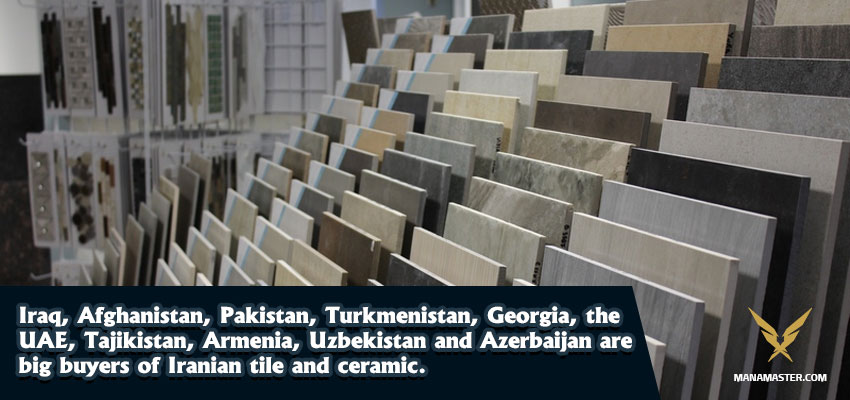
Advantages of Importing Tiles from Iran:
1.Rich Cultural Heritage: Iranian tiles reflect a rich cultural heritage that spans thousands of years. They often incorporate intricate patterns, calligraphy, and traditional motifs, adding a unique and visually captivating element to any project. Importing tiles from Iran allows you to showcase this cultural heritage and offer customers a distinct and culturally significant product.
2.Quality Craftsmanship: Iranian tile manufacturers have a long-standing tradition of producing high-quality tiles. Skilled artisans utilize traditional techniques combined with modern technology to create tiles that are known for their durability, strength, and fine craftsmanship. Importing tiles from Iran ensures that you offer your customers products of exceptional quality.
3.Wide Range of Designs: Iranian tiles come in a wide variety of designs, colors, and patterns. Whether you’re looking for traditional Persian designs or contemporary styles, Iranian manufacturers offer a diverse range of options to cater to different aesthetic preferences. This versatility allows you to provide a comprehensive selection of tiles to meet the demands of your target market.

4.Skilled Artisans and Craftsmanship: Iranian tile manufacturers employ skilled artisans who possess expertise in ceramic production techniques. These craftsmen combine traditional methods with modern technology, resulting in tiles of exceptional quality and craftsmanship. The attention to detail, precision, and mastery of techniques contribute to the durability, strength, and overall aesthetic appeal of Iranian tiles.
5.Competitive Pricing: Importing tiles from Iran can be cost-effective compared to sourcing from other countries. Iranian manufacturers often offer competitive pricing without compromising on quality. This affordability enables you to maintain a competitive edge in the market while delivering value to your customers.
6.Customization Options: Many Iranian tile manufacturers are open to customization requests, allowing you to tailor the tiles according to specific project requirements. Whether it’s a custom design, size, or color, Iranian suppliers are often flexible and willing to accommodate customization needs, providing you with greater flexibility and options for your customers.
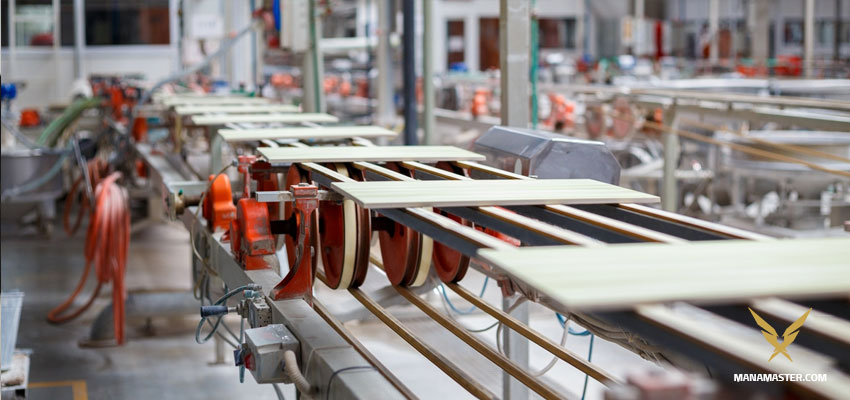
7.Sustainable and Environmentally Friendly: Iranian tile manufacturers are increasingly adopting eco-friendly practices and utilizing sustainable materials. If sustainability is an important aspect of your business or your customers’ preferences, importing tiles from Iran can align with your sustainability goals.
8. Abundance of Natural Resources: Iran is rich in natural resources, including clay and minerals used in ceramic tile production. The availability of high-quality raw materials contributes to the production of tiles with excellent physical properties, such as strength, durability, and resistance to wear and tear. This advantage enables Iranian manufacturers to offer tiles of superior quality in terms of material composition and performance.
9.Strong Domestic Market: Iran has a sizable domestic market for ceramic tiles driven by population size, urbanization, and construction activities. The strong domestic demand provides a stable foundation for the industry, supporting investment in production capabilities, technological advancements, and quality improvements. The industry’s success in the domestic market translates into the potential for increased production capacity and economies of scale for export-oriented operations.
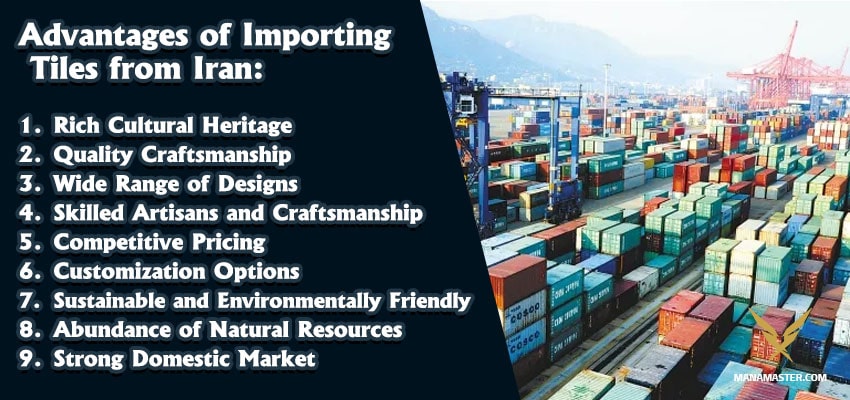
By leveraging these strengths, the Iranian ceramic tile industry has the potential to expand its market share, build strong partnerships with international customers, and contribute to the global appreciation of Iranian craftsmanship and artistic traditions.
Weaknesses of Iran’s ceramic tile industry
While Iran’s ceramic tile industry has several strengths, it also faces some challenges and weaknesses. Here are a few of them:
- Limited International Marketing and Branding: The Iranian ceramic tile industry faces difficulties in effectively marketing and promoting its products on the international stage. Insufficient branding efforts and limited exposure result in lower awareness and recognition of Iranian tile brands compared to competitors from countries with stronger marketing strategies.
- Technological Advancements and Innovation: The industry’s pace of technological advancements and innovation can be slower compared to some leading ceramic tile manufacturing countries. Limited investments in research and development, as well as the adoption of advanced manufacturing technologies, can impact the industry’s competitiveness and ability to meet evolving market demands.
- Export Restrictions and Sanctions: Iran has faced various economic sanctions and export restrictions imposed by international entities. These limitations can affect the industry’s ability to access global markets, hindering its growth potential and making it more challenging to compete with manufacturers from countries without such restrictions.
- Infrastructure and Logistics: The industry’s efficiency and competitiveness can be hampered by infrastructural limitations and logistical challenges. Inadequate transportation networks, customs procedures, and shipping services can result in longer lead times, higher costs, and logistical complexities for both exporters and importers.
- Fragmented Industry Structure: The ceramic tile industry in Iran is characterized by a relatively fragmented structure, with numerous small and medium-sized manufacturers operating in the market. This fragmentation can sometimes lead to inconsistencies in quality standards, product offerings, and the ability to meet large-scale orders or specific customer requirements.
It’s worth noting that despite these weaknesses, the Iranian ceramic tile industry continues to produce high-quality and visually appealing tiles. Addressing these challenges and building upon the industry’s strengths can further enhance its competitiveness and enable it to expand its market share in the international arena.

Conclusion:
Importing tiles from Iran offers the opportunity to add a touch of Iranian craftsmanship and cultural heritage to your projects or business. By conducting thorough research, establishing clear communication, and navigating the import process diligently, you can successfully buy and import tiles from Iran, delighting customers with the beauty and quality of these exquisite creations
Remember to stay informed about the latest trade regulations and maintain good relationships with suppliers, ensuring a smooth and sustainable partnership
in the long run. With careful planning and execution, your tile import business can thrive and contribute to the appreciation of Iran’s rich artistic traditions in the global market.
